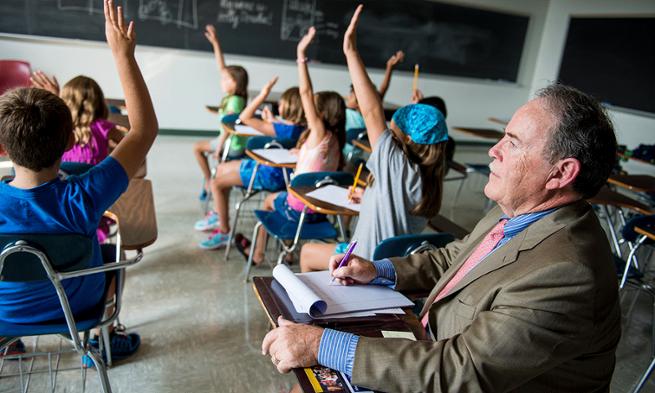Reimagining reform
Education
Beyond the performance tests: Teachers provide support, guidance and hope for all children
By Phillip M. Wishon, Dean, JMU College of Education
Few descriptors capture the focus of American education and our nation’s public schools today better than the term “education reform” — reform that reflects a strong desire to increase students’ achievement in the basic skills as measured by outcomes on batteries of standardized tests.
There is broad acknowledgment that reform in educational practices needed to occur as assessments of the performances of American youth in mathematics and literacy/reading in recent years has revealed lower levels of achievement compared with that of youth in many other industrialized nations.
‘We help our candidates understand that their students can get all A’s but still flunk life.’
Education reform at its best facilitates teacher-guided journeys of discovery during which teachers and students alike learn to connect with their personal and shared humanity, experiencing in the process discovery of selves, of community, and of all that we survey. Through such journeys a fascination with the beckoning knowable universe is instilled, and within everyone who would dream, an endless curiosity is stirred.
While one has heard much about how the implementation of education reform efforts in many schools has led to increased levels of stress on educators and students, too little has been heard about a consequential, if unspoken, goal of effective education reform: namely, how deeply absorbed searches for that which is just beyond our intellectual and emotional understanding are central to the core of our nature as humans.
Here at JMU we encourage our students and future educators to embrace the challenge of trying to raise not just the intellectual quotient of the students whose lives they will help guide, but also the ethical, just and moral quotient of professional practice, civil discourse, and civic responsibility. We help our candidates understand that their students can get all A’s but still flunk life. We help our students understand that along with helping their future students become accomplished in the fields of communication arts, mathematics, science, technology and the social sciences, they must also help them learn to think critically, ethically, and creatively about events and circumstances that imperil their relationships with others, with other of the planet’s inhabitants and with the planet itself.
Sixty years after the Supreme Court ruling in Brown v. Board of Education high incidences of poverty, violence, family dysfunction and social injustice serve as constant reminders in the lives of too many American children that it’s not a perfect world, and that the promise of Brown has yet to be fulfilled.
Unfortunately, not all students arrive at school every day well-rested, well-nourished, fit, emotionally secure, in good health, and ready to learn. To the critical needs of these children the foundational academic narrative of the education reform movement has yet to be sufficiently responsive.
Our message to our candidates is unambiguous: We have confidence that they will step forward — just as thousands of Madison-prepared educators before them stepped forward in their time — to provide support, guidance, and reason for hope for all children, not because it’s on some performance test — caring isn’t tested — but because it’s the right thing to do. We have faith that they will cultivate history, not be by-standers to it. It’s not about adopting values and practices that are in vogue, it’s about questioning them — and maybe, using the best that humankind has imagined and expressed, to offer alternatives.
'We take great pride in holding ourselves accountable for surpassing the most rigorous state and national standards of professional excellence.'
We are committed to continuous professional improvement in the quality of our educator preparation programs, and we take great pride in holding ourselves accountable for surpassing the most rigorous state and national standards of professional excellence. As testament to the quality of our programs, we recently undertook and successfully completed a multi-year state and national accreditation and strategic planning process that resulted in reaccreditation of our programs — a distinction that we have enjoyed since national accreditation was inaugurated in 1954.
At the heart of this important exercise in self-reflection and analysis is the conviction that our programs should resonate in distinctly civil and humane ways and that we must help advance a compassionate concept of schooling and of society. We believe that our candidates should complete their programs determined to help address core issues of our time: What can educators do to help protect children from injury and social inequity? How can educators help address the needs of communities in peril? What can educators do to contribute to attainment of a more ideal human condition among societies the world over?
It is our determination to explore deeply these and other vexing issues which animates our work here at JMU, not pursuit of acclaim or select rankings. This is our professional address: not our ZIP code, but our professional code; not where we reside, but where we stand.
Learn more about the College of Education.
Learn more about the Madison Experience.
